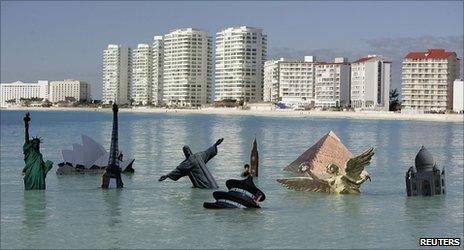Viewpoint: Small steps offer no respite from climate effects
- Published

In a viewpoint article, Professor Kevin Anderson, the director of the Tyndall Centre for Climate Change Research, evaluates the outcome of the UN climate summit in Cancun and argues that success at next year's negotiations will not compensate for "failure" at previous talks.
When are we going to find the courage to move away from the astrology and towards the science of climate change?
The astrology tells us that Cancun represents a platform for future and more substantive agreements after which low-carbon technologies will save the day.
The science tells us climate change is an issue of emissions accumulating in the atmosphere and consequently every time we fail to agree meaningful reductions we lock our future into higher temperatures.
In other words, next year's negotiations cannot compensate for this and previous years' failures.
As the delegates returned home from Cancun: one thing was certain; the emissions arising from the event would remain in the atmosphere and irrevocably warm the climate for the coming century.
This is where climate change is so different from many of the other problems we have faced and dealt with.
Timeframe of change
Climate change impacts have a timeframe of decades to centuries.
By contrast, to avoid what are commonly considered dangerous levels of such impacts, emissions need to begin reducing rapidly now.
In the meantime, every molecule of carbon dioxide emitted simply adds to all those emitted over the past century, inexorably increasing the level of warming and consequently the scope and scale of the impacts.
This should be a challenging and increasingly uncomfortable message for all concerned.
Instead, climate negotiations continue to be informed by the astrological view, where - through either ignorance or a desire to save face - it is assumed the problem will be the same next year as this.
The science, however, tells a very different story. Next year, the problem will have become worse - as it has done each and every day that we have failed to reduce emissions since the Earth Summit in Rio in 1992.
The difficulty with the science is that it lays bare the inadequacy of our favoured response to climate change.
Despite increasing mutterings about behaviour and consumption, the only "solutions" we're really prepared to countenance are low-carbon technologies that confer win-win economic benefits and demand nothing more of us than a substitution of high-carbon technologies by low-carbon alternatives.
'Stick to the numbers'
Whilst this fits well with the astrological take on climate change, where meeting future targets is what matters, it is at odds with the science of emissions building up in the atmosphere.
However many virtues we bestow on low carbon technologies, they cannot replace the high carbon incumbents at a sufficient rate to make anything other than a dent in the rate of reductions we require.
Consequently, whilst such technologies are a prerequisite of a transition to a low carbon future, they are wholly inadequate for the pressing issues of rising emissions we face today.
The upbeat utterances on which we are told international diplomacy and negotiations depend have so far failed to trigger any meaningful action to reduce emissions.
After 18 years it is perhaps time to ditch any and all astrology and turn directly to the numbers and the science to inform policy.
There is currently nothing substantive to suggest we are heading for anything other than a 4C rise in temperature, possibly as early as the 2060s.
Yet over a pint of ale or sharing a coffee it is hard to find any scientist seriously engaged in climate change who considers a 4C rise within this century as anything other than catastrophic for both human society and ecosystems.
Moreover, ask those same scientists if 4C is likely to be as high as it could get prior to the temperature beginning to fall, and many will shake their heads pointing to a range of discontinuities (tipping points) that may see us witness temperatures increasing well beyond 4C.
Against such a backdrop, is it therefore not time for those of us who work in climate change to refrain from finessing our analysis, and instead be as blunt and direct publicly as we are prepared to be privately?
Until such time, policymakers will remain ill-equipped to embrace the science and escape the astrology; and next year's negotiations in Durban and those the following year in Rio will be doomed to failure before they even start.